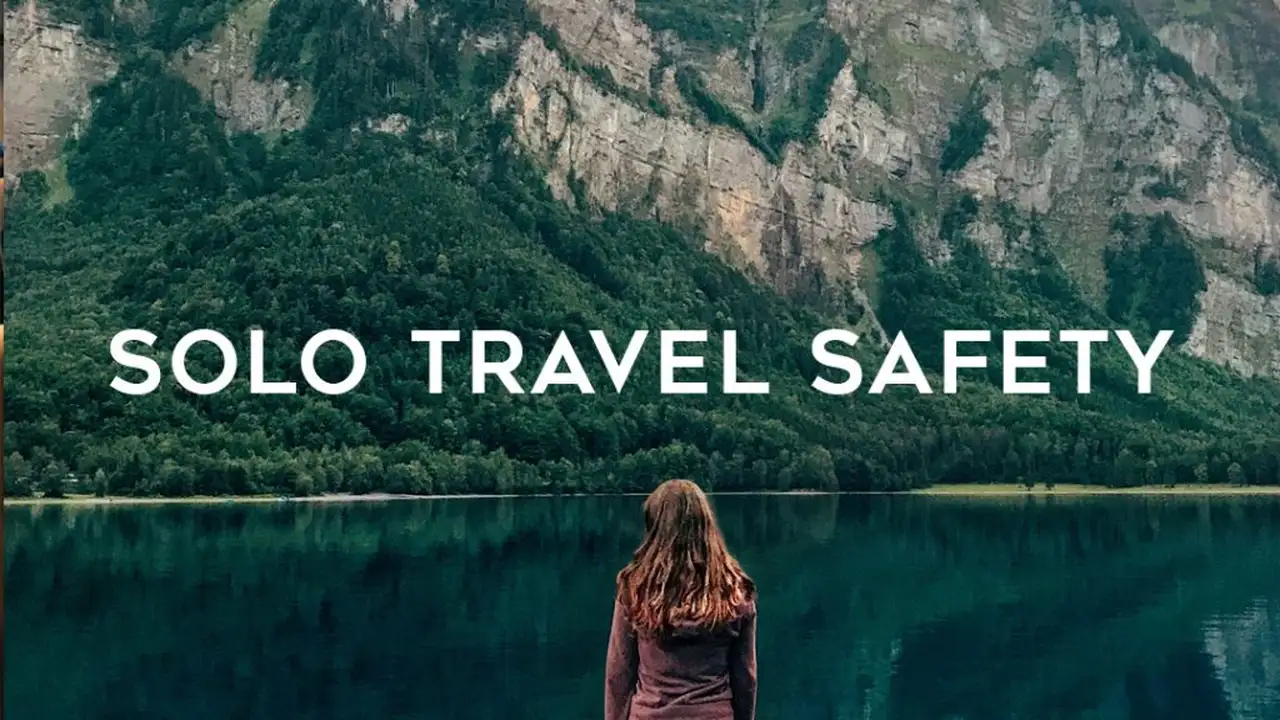Cybersecurity Solo Travel Protection
Protecting your data and devices while traveling solo. This article provides cybersecurity tips for using public Wi-Fi and avoiding online scams. Stay safe online during your trip.

Why Cybersecurity Matters for Solo Travelers
Hey there, fellow solo adventurers! Let's face it, traveling alone is awesome. But in today's digital world, cybersecurity is just as important as packing your passport. Think about it: you're relying on your phone for maps, booking accommodations, staying in touch with loved ones, and maybe even working remotely. A compromised device or account can lead to serious headaches, from identity theft to financial loss. So, let’s dive into how to keep your digital life safe while you explore the world.
Securing Your Devices: The Foundation of Solo Travel Cybersecurity
First things first, let's lock down your devices. This is your digital fortress, so treat it like one!
Strong Passwords and Two-Factor Authentication
Seriously, ditch the \"123456\" password. Use strong, unique passwords for every account. I know, it's a pain to remember them all. That's where password managers come in handy. Services like LastPass, 1Password, and Dashlane generate and store complex passwords securely. Plus, enable two-factor authentication (2FA) whenever possible. This adds an extra layer of security by requiring a code from your phone in addition to your password. It's like having a double lock on your front door.
Keeping Software Updated: Essential Cybersecurity for Solo Travel
Outdated software is a hacker's playground. Make sure your operating system, browser, and apps are always up-to-date. These updates often include security patches that fix vulnerabilities. Most devices have automatic update options – turn them on! It's a simple way to stay protected.
Antivirus Software: A Shield Against Malware for Solo Travelers
Install a reputable antivirus program on your laptop and phone. Think of it as a bodyguard for your devices. Good options include Norton, McAfee, Bitdefender, and Avast. These programs scan for malware, viruses, and other threats. Run regular scans and keep the software updated for maximum protection.
Navigating Public Wi-Fi: Cybersecurity Risks and Solutions for Solo Travelers
Ah, free Wi-Fi. A solo traveler's best friend, right? Well, not always. Public Wi-Fi networks are often unsecured, making them a prime target for hackers. But don't worry, you can still use them safely.
Using a VPN: Your Cybersecurity Armor on Public Wi-Fi
A Virtual Private Network (VPN) encrypts your internet traffic, making it unreadable to prying eyes. It's like tunneling through the internet, keeping your data safe and private. Before connecting to public Wi-Fi, turn on your VPN. Popular options include NordVPN, ExpressVPN, Surfshark, and CyberGhost. They usually cost a few dollars a month, but the peace of mind is worth it.
Avoiding Sensitive Activities on Public Wi-Fi
Even with a VPN, it's best to avoid sensitive activities like online banking or entering credit card information on public Wi-Fi. If you absolutely must, use your mobile data or wait until you have a secure connection.
Checking for HTTPS: A Simple Cybersecurity Check on Websites
Before entering any personal information on a website, make sure it uses HTTPS (Hypertext Transfer Protocol Secure). You'll see a padlock icon in the address bar. This indicates that the connection is encrypted. If you don't see the padlock, proceed with caution.
Spotting and Avoiding Online Scams: Cybersecurity Awareness for Solo Travelers
Scammers are always coming up with new ways to trick people, and solo travelers are often seen as easy targets. Stay vigilant and be aware of common scams.
Phishing Emails and Messages: Spotting Cybersecurity Red Flags
Phishing emails and messages are designed to trick you into giving up personal information. They often look like they're from legitimate companies or organizations. Be wary of emails asking for your password, credit card details, or other sensitive information. Always double-check the sender's email address and look for grammatical errors or suspicious links. Never click on links in suspicious emails or messages.
Fake Wi-Fi Hotspots: A Cybersecurity Trap for Solo Travelers
Scammers sometimes create fake Wi-Fi hotspots that look like legitimate networks. Before connecting to a public Wi-Fi network, confirm the name with a staff member or check for official signage. Avoid connecting to networks with generic names like \"Free Wi-Fi\" or \"Public Wi-Fi.\"
Travel Booking Scams: Protecting Your Finances During Solo Travel
Be cautious when booking flights, accommodations, or tours online. Use reputable booking sites and double-check the details before entering your payment information. Be wary of deals that seem too good to be true. Always read reviews and check for a secure payment gateway.
Recommended Cybersecurity Products for Solo Travelers: A Detailed Comparison
Okay, let's get specific. Here are a few cybersecurity products that can help you stay safe on your solo travels:
VPNs: A Comparison of Top Cybersecurity Choices for Solo Travel
- NordVPN: Known for its speed, security, and user-friendly interface. Offers a wide range of servers and advanced features like double VPN and Onion over VPN. Price: Around $4 per month with a long-term plan.
- ExpressVPN: Another top-rated VPN with excellent speed and security. Offers servers in a wide range of countries and a strict no-logs policy. Price: Around $8 per month with a long-term plan.
- Surfshark: A budget-friendly VPN that offers unlimited device connections. Great for families or groups traveling together. Price: Around $2.50 per month with a long-term plan.
- CyberGhost: A user-friendly VPN with a large server network. Offers dedicated servers for streaming and torrenting. Price: Around $2.25 per month with a long-term plan.
Password Managers: Securely Storing Your Credentials for Solo Travel Cybersecurity
- LastPass: A popular password manager that offers a free plan and a premium plan with advanced features. Stores passwords securely and generates strong passwords. Price: Free (limited features) or $3 per month for Premium.
- 1Password: A secure password manager that offers a range of features, including password generation, secure notes, and two-factor authentication. Price: Around $3 per month.
- Dashlane: A feature-rich password manager that offers automatic password changing and a VPN. Price: Around $5 per month.
Antivirus Software: Protecting Your Devices from Malware During Solo Adventures
- Norton: A well-known antivirus program that offers comprehensive protection against malware and other threats. Price: Varies depending on the plan.
- McAfee: Another popular antivirus program that offers a range of features, including a firewall and a password manager. Price: Varies depending on the plan.
- Bitdefender: A highly-rated antivirus program that offers excellent protection against malware and other threats. Price: Varies depending on the plan.
- Avast: A free antivirus program that offers basic protection against malware and other threats. Offers paid plans with advanced features. Price: Free (limited features) or paid plans with varying prices.
Staying Safe on Social Media: Cybersecurity Considerations for Solo Travelers
Sharing your travel adventures on social media is fun, but it's important to be mindful of your security and privacy.
Adjusting Privacy Settings: Controlling Your Cybersecurity Footprint on Social Media
Review your privacy settings on social media platforms and adjust them to limit who can see your posts and personal information. Avoid sharing sensitive information like your location or travel plans publicly.
Being Mindful of Check-Ins: Cybersecurity Risks of Publicly Sharing Your Location
Be cautious about checking in to locations on social media, especially if you're traveling alone. This can let people know that you're away from home, making you a target for burglars. Consider sharing your photos and updates after you've left the location.
Avoiding Oversharing: Maintaining Cybersecurity Boundaries on Social Media
Avoid sharing too much personal information on social media, such as your home address, phone number, or travel itinerary. This information can be used by scammers or identity thieves.
Additional Cybersecurity Tips for Solo Travelers
- Back up your data regularly to an external hard drive or cloud storage service.
- Use a screen lock on your devices to prevent unauthorized access.
- Be wary of unsolicited emails or messages asking for your personal information.
- Report any suspicious activity to the authorities.
- Trust your gut. If something feels off, it probably is.
Traveling solo is an incredible experience. By taking a few simple cybersecurity precautions, you can protect your data and devices and enjoy your adventure with peace of mind. Stay safe out there!
:max_bytes(150000):strip_icc()/277019-baked-pork-chops-with-cream-of-mushroom-soup-DDMFS-beauty-4x3-BG-7505-5762b731cf30447d9cbbbbbf387beafa.jpg)






